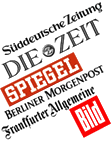Just a big fish
Even the Kursk does not rest peacefully at the bottom of the sea, as Die Welt has, over the past two weeks, devoted precious space to the opening of the sub.
New Russian theories surface daily regarding the Kursk and the crash that never was. Vice-Admiral Vladimir Dobroskochenko recently admitted on Russian television that the Kursk did not crash into another submarine but rather "the skeleton of a big fish" (Die Welt, 8 November). It is surprising that the news of yesterday should still be playing such a prominent role in media reports today; however, as this is the second such week of superficial stories on the Kursk, it could no longer be ignored even in this column.
Delusions in the Duma
At the same time, the Russian Duma debated, albeit briefly, whether it should monitor the elections in the United States ("The Duma Is Concerned with Democracy," Die Tageszeitung, 6 November). Perhaps we should laud this rare concern on the Russians' part for something that, for their nation, has proven to be elusive: democracy.
Having barely survived ten years of instability after decades of dictatorship and monarchical rule, some Russians now feel themselves qualified to come to the United States to act as that proverbial watchful eye. After all, let them not crowd their heads with worries of a Russian president who is proud of his KGB heritage, the legacy of Stalin that lives on in Russia unaddressed or the war in Chechnya that continues to be waged.
Nuclear theatre
The issue of the Temelín nuclear power plant in south Bohemia was raised once again, this time at a festival of German theatre which opened this past week in Prague (Die Welt, 9 November), showing that even the arts are not immune to this growing debate. Ironically enough, some of the Austrian actors were affected by the road blockades of their countrymen, who continued to protest against the plant at several crossings along the Czech-Austrian border. Some were forced to book last minute flights in order to get to the Czech capital on time.
The question still remains, could Temelín possibly be an issue in EU enlargement negotiations? All indicators would say no. This, however, does not prevent Temelín from being the biggest conflict between neighbours who share a border and should be, on most counts, friends.
Polish bureaucracy
Germany and Poland, too, share a border. However, being friends is easier said than done. It seems that for the second week now Germans have betrayed a certain mistrust of Polish affairs, and not necessarily without reason. Last week, this column reported on the German view of Polish agriculture, especially in light of European Union enlargement talks. Agriculture is one of the big problem areas on the Polish list of accession issues. Another, almost equally as pressing, is the country's looming bureaucracy.
The Tageszeitung's article, "A Completely Normal Procedure," (7 November) documents, step by painstaking step, the attempts of a journalist to reclaim his car after it was impounded in Warsaw. Apparently, any car from an EU country which is driven by a Pole in Poland is cause for investigation. The article itemises the frustrations involved in trying to find the person responsible for the case, nevermind trying to find the car itself.
Only after threatening to continue the search for the car in the company of a journalist from the Polish daily Gazeta Wyborcza did a friendlier face appear, whereby one Pole in the article is quoted as saying that "Poland is not ready for the European Union but rather for the Soviet Union."
Good reports for Poland and Czech Republic
This, however, is patently not the case. Die Welt noted on 8 November that Poland and the Czech Republic would receive good marks in the European Commission's (EC) annual enlargement updates. Poland alone pulls half the foreign investment of all accession candidates. There was, however, very little pre-enlargement update analysis of how the reports in some countries might turn out.
The EU meeting in December in Nice could still bring surprises.
Milošević steps down
Finally, from Yugoslavia, Der Tagesspiegel reported on 8 November that Slobodan Milošević no longer wants to be leader of his party, the SPS. A possible explanation: campaigning might prove fatal for Milošević in a country that is not kind to fallen dictators.
Andrea Mrozek, 8 November 2000
Moving on:
- Archive of German press reviews
- Browse through the CER eBookstore for electronic books
- Buy English-language books on Central Europe through CER
- Return to CER front page
Sources:
Süddeutsche Zeitung
Der Tagesspiegel
Die Tageszeitung
Die Welt
Die Zeit



